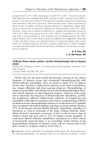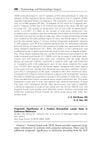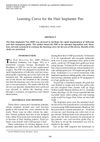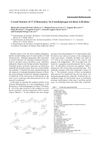 April 2016 in “Journal of Investigative Dermatology”
April 2016 in “Journal of Investigative Dermatology” Mefloquine, an antimalarial drug, is effective in killing melanoma cells resistant to other treatments by causing lethal stress in the cells.
 April 2016 in “Journal of Investigative Dermatology”
April 2016 in “Journal of Investigative Dermatology” Using a stimulating cream shampoo before applying Minoxidil helps it penetrate hair follicles better, enhancing its hair growth-promoting effect.
 April 2016 in “Journal of Investigative Dermatology”
April 2016 in “Journal of Investigative Dermatology” Microneedle arrays deliver botulinum toxin effectively for sweat suppression, similar to injections.
 April 2016 in “Journal of Investigative Dermatology”
April 2016 in “Journal of Investigative Dermatology” Phenylephrine may help prevent hair loss from pulling on the hair roots.
 January 2016 in “Springer eBooks”
January 2016 in “Springer eBooks” New materials and methods could improve skin healing and reduce scarring.
 January 2016 in “Skin appendage disorders”
January 2016 in “Skin appendage disorders” The document discusses various nail and hair disorders and their treatments.
 September 2015 in “British Journal of Dermatology”
September 2015 in “British Journal of Dermatology” Most clinicians follow discharge guidelines, many lupus patients don't use sunscreen regularly, dithranol is effective for psoriasis, biopsy methods should be based on lesion type, voriconazole may raise skin cancer risk, a new scale can help diagnose female hair loss early, and most melanomas may develop from existing moles.
 May 2015 in “Journal of Investigative Dermatology”
May 2015 in “Journal of Investigative Dermatology” Wnt-3a helps grow more skin stem cells, which could lead to new hair loss treatments.
 July 2012 in “EFSA supporting publications”
July 2012 in “EFSA supporting publications” The EFSA maintained its view that spermidine's effect on hair growth is related to disease treatment and does not meet the health claim criteria.
 March 2012 in “EFSA Journal”
March 2012 in “EFSA Journal” Iron intake has not been proven to maintain normal hair growth.
 January 2012 in “Yearbook of Dermatology and Dermatologic Surgery”
January 2012 in “Yearbook of Dermatology and Dermatologic Surgery” Iron deficiency is not more common in women with hair loss, and neurogenic rosacea may need different treatment.
 January 2012 in “Yearbook of Dermatology and Dermatologic Surgery”
January 2012 in “Yearbook of Dermatology and Dermatologic Surgery” The study concluded that a 'Swiss cheese' pattern in hair follicles is a useful sign for diagnosing alopecia areata.
 January 2011 in “Yearbook of Dermatology and Dermatologic Surgery”
January 2011 in “Yearbook of Dermatology and Dermatologic Surgery” Finding a positive nonsentinel lymph node in melanoma patients indicates a worse prognosis.
 January 2010 in “The Year book of dermatology”
January 2010 in “The Year book of dermatology” Taking metformin with intense pulsed light therapy improves hair removal for women with PCOS.
 March 2005 in “International Journal of Cosmetic Science”
March 2005 in “International Journal of Cosmetic Science” DVI provides detailed 3D imaging of hair and shows how various products protect and enhance hair.
 March 2005 in “International Journal of Cosmetic Science”
March 2005 in “International Journal of Cosmetic Science” A new method helps understand hair shine and various products improve hair care.
 June 2001 in “International Journal of Cosmetic Surgery and Aesthetic Dermatology”
June 2001 in “International Journal of Cosmetic Surgery and Aesthetic Dermatology” The Hair Implanter Pen increases speed and is gentle on grafts, with users mastering it after a few tries.
 February 1999 in “Analytical Sciences”
February 1999 in “Analytical Sciences” A new antiandrogen compound was made and its detailed three-dimensional shape was described.
 December 1998 in “Acta Crystallographica Section C-crystal Structure Communications”
December 1998 in “Acta Crystallographica Section C-crystal Structure Communications” A new compound with strong antiandrogenic effects was found, potentially useful for treating conditions like acne and prostate cancer.
 April 1998 in “Journal of women's health”
April 1998 in “Journal of women's health” Hair loss in women is often due to hereditary conditions or stress, and while treatments like minoxidil can help, diagnosis and management require medical guidance.

Eating less calories, focusing on complex carbs, and reducing fats can help manage type II diabetes.

The document concludes that various skin conditions have specific treatments and that adequate calcium intake may prevent osteoporosis.

Doctors recommend postoperative radiation for male breast cancer, advise against testosterone for vasomotor symptoms post-adrenalectomy, suggest non-hormonal treatments for atrophic vaginitis after mastectomy, note no specific treatment for anticoagulant-induced hair loss, and call for more research on silicosis from silicon carbide exposure.
 May 2017 in “Journal of The American Academy of Dermatology”
May 2017 in “Journal of The American Academy of Dermatology” Microneedling with PRP and minoxidil (5%) improves hair growth more than minoxidil (5%) alone.
 April 2016 in “Journal of Investigative Dermatology”
April 2016 in “Journal of Investigative Dermatology”  1744 citations,
August 2006 in “The Journal of Clinical Endocrinology and Metabolism”
1744 citations,
August 2006 in “The Journal of Clinical Endocrinology and Metabolism” Polycystic Ovary Syndrome should be seen mainly as a condition of excess male hormones, with a focus on this in its definition.
 1540 citations,
October 2008 in “Fertility and Sterility”
1540 citations,
October 2008 in “Fertility and Sterility” The report concludes that PCOS is mainly a condition of excess male hormones and its definition may change as new information is discovered.
 1514 citations,
December 2011 in “Fertility and sterility”
1514 citations,
December 2011 in “Fertility and sterility” Experts agree that PCOS affects women's health in complex ways, but more research is needed to understand and treat it effectively.
 1341 citations,
January 2014 in “Cardiology Research and Practice”
1341 citations,
January 2014 in “Cardiology Research and Practice” Managing metabolic syndrome needs both lifestyle changes and medical treatments.
 1308 citations,
March 1998 in “Journal of bone and mineral research”
1308 citations,
March 1998 in “Journal of bone and mineral research” The vitamin D receptor is crucial for bone health and affects various body systems, with mutations potentially leading to disease.





























